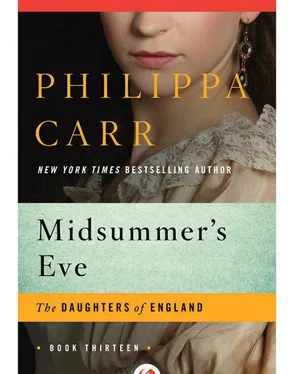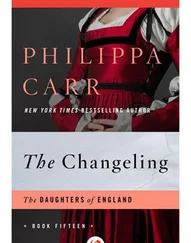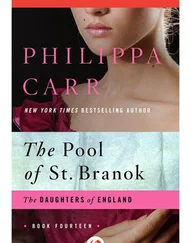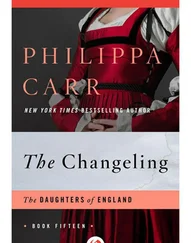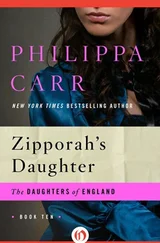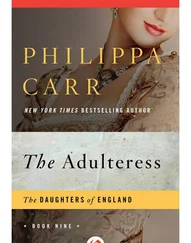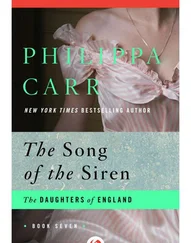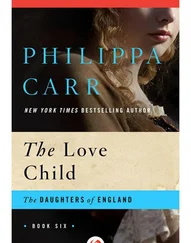“No,” I said. “I certainly do not. There is only one of you. But that is different from being Mother Ginny.”
“Why?”
“Because you are rich and important.”
“Oh, there you have hit the nail right on the head. I can afford to be eccentric. I can do the strangest things and people dare not question.”
“They would be afraid to.”
“Because their well-being depends on me to some extent. That is why they respect me. They do not depend on Mother Ginny in that way but they think she has powers which come from the unknown and they are afraid of her.”
“It is a good thing to have people afraid of you.”
“If you are strong, perhaps. But the poor and the humble … they must beware.”
I continued to think of Mother Ginny. I was fascinated by everything connected with her—and that included Digory. I used to lie in wait for him and talk to him. We would sit on the banks of the river throwing stones into the water—a favourite occupation of his—listening to the plop as they dropped and seeing who could throw the farthest.
He asked me questions about the Big House, “That Cador” he called it. I described it in detail: the hall with its refectory table set with pewter plates and goblets; the coat of arms on the wall among the weaponry; helmets and halberds; the Elizabethan pole-arm, swords and shields; the drawing room with its tapestries depicting the Wars of the Roses; the fine linen-fold panelling; the punch room where the men took their punch and port wine; the chairs with their backs exquisitely embroidered in Queen Anne’s tatting; the room where King Charles had slept when he was fleeing from the Roundheads—a very special room this, which must never be altered. I told him how I used to climb onto the bed in which the King had lain listening for the approach of his enemies and wondering how long it would be before they hunted him out.
Digory would listen intently. He used to call out: “Go on. Go on. Tell me some more.”
And I would romance a little, making up stories of how the great Cador—the Warrior—had saved the King from capture; but reverence for the history learned from my governess, Miss Caster, made me add hastily: “But he was caught in the end.”
I told him about the solarium, the old kitchens and the chapel with its stone floor and squint through which the lepers used to look because, on account of their disease, they were not allowed to come in where ordinary folks were.
He was fascinated by the squint. I told him that there were two other peepholes in the house. These we called peeps. One of them looked down on the hall so that people could see who their visitors were without being seen themselves. This was in the solarium; the other was in another room. This looked down on the chapel. It was in an alcove where ladies could sit and enjoy the service from above on those occasions when there were guests in the house with whom it would be unseemly for them to mix.
In exchange he told me a little about his home which he was at pains to make me believe was more impressive than my own. In a way it was because it was so strangely mysterious. Cador was a magnificent house but there were many such houses in England; and according to Digory there were no cottages in the world like Mother Ginny’s.
Digory had a natural eloquence which even a lack of conventional education could not stem. He made me see the room which was like a cavern from another world. Jars and bottles stood on the shelves—all containing some mysterious brew. Drying herbs hung on the rafters; a fire always burned in the grate and it was like no other fire; the flames were blue and red and pictures formed in them. Battles were fought; the Devil himself appeared once with red eyes and a red coat and black horns in his head. By the fire sat the cat which was no ordinary cat; she had red eyes and when the firelight shone on them they were the colour of the Devil’s eyes, which showed she was one of his creatures. There was a black cauldron on the fire, always bubbling, and in the steam which rose from it spirits danced. Sometimes Digory could see the face of some inhabitant of the neighbourhood; and that meant something important. He was always discovering something fresh. There were two rooms in the cottage—one leading from the other. The one at the back was where he and his grandmother slept—she on the truckle bed with a red cover, and the black cat always slept at the foot of her bed. Digory’s place was on the talfat—a board placed immediately below the ceiling which I was able to visualize because I had seen it in some of the labourers’ cottages. There was a stone-paved yard at the back and in this was an outhouse in which Mother Ginny stored her concoctions—a source of income to her and which could cure anything from a cold in the head to a stone in the kidney. She was very clever; she could get babies for people who wanted them and get rid of them for people who didn’t want them. She was as clever as God.
“She couldn’t be a god,” I told him. “She would have to be a goddess. Of course she is rather ugly for one of them, but I suppose some of them might have been ugly. There were the Gorgons and Medusa. Fancy having snakes for hair. Can your grandmother make her hair into snakes?”
“Of course,” said Digory.
I was very over-awed and longed to see inside Mother Ginny’s cottage though I feared to.
The harvest had been bad that year. I heard my father talking very seriously to my mother about it. He said the farmers would be tightening their belts. Last year’s had not been too bad; but this one was really alarming.
Jacco and I used to ride round the estate with him quite frequently. He wanted us to show an interest in it.
“The most important thing for a landowner is to be proud of his estate,” he told us. “He has to care for it as he would for a person.”
He always listened with sympathy to what the tenants had to say. It was said that having had to “rough it” himself, he had a special understanding of their troubles, unlike some squires who had been accustomed to soft living all their lives. My father was much loved for this quality as well as respected.
Following on the bad summer came the hard winter. I awoke most mornings to see a frosty pattern on the windows; there was tobogganing down the hill and skating on the river. The gales were so strong that the fishermen could not go out. During most mornings people went down to the beach to collect driftwood. Fires were needed all through the day and night to keep the house reasonably warm.
We were all longing for the spring.
And what a pleasure it was when it came—at last to see the buds appearing on the trees and in due course to hear the first cuckoo. I remember a spring morning when I went riding with my father. It was a holiday so I was free from my desk and my father had suggested I go with him on his rounds.
We called at the Tregorrans’ farm and sat talking in the kitchen where Mrs. Tregorran brought forth a batch of currant buns from the oven and my father and I tasted one each and drank a glass of the Tregorran cider.
Mr. Tregorran was a somewhat morose man; his wife was melancholy too. So gloom pervaded the house. Mr. Tregorran talked with habitual pessimism of the effect the weather had had on crops and livestock. His mare Jemima was in foal. He hoped luck would not run against him and that she would bring forth a healthy animal, though he doubted this, due to the conditions of the last months.
“Poor Tregorran,” said my father as we rode away. “But he really enjoys bad luck so perhaps we should not pity him too much. Never look on the black side, Annora, or you can be sure fate will find a way of turning that side towards you. Now let’s call on the Cherrys and get the other side of the picture right away. I always like to do those two together.”
Читать дальше
